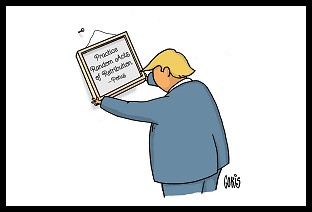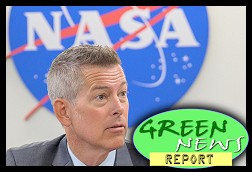
 Now available on Apple iTunes!
Now available on Apple iTunes!
Subscribe for FREE here!...
(Brad and I are on the road, so we prepared this report for you before we left! --- Des)
IN TODAY'S AUDIO REPORT: Too late to save the world's fish?; Big trees grow smaller ... PLUS: A jump start for the electric car industry... All that and more in today's Green News Report!
Got comments, tips, love letters, hate mail? Drop us a line at GreenNews@BradBlog.com or right here at the comments link below. All GNRs are always archived at GreenNews.BradBlog.com.
IN 'GREEN NEWS EXTRA' (links below): U.S. bats are dropping dead; Recyclers, scientists probe Great Pacific Garbage Patch for profit and planet; Whole Foods Exec Slams Health Care Reform... PLUS: Do Seed Companies Control GM Crop Research?
Info/links on those stories and all the ones we talked about on today's episode follow below...
- Saving Fish is Possible, Unless They’re Past the Tipping Point (Wired) [emphasis added]:
“In most cases, when you reduce fishing pressure enough, the stock rebounds. But there’s a breaking point beyond which the system has changed so much that it may not recover,” said Boris Worm, a marine biologist at Canada’s Dalhousie University. “The longer you wait to fix a situation, the harder it becomes.”
...
From those perspectives, the new study is hopeful. But looked at another way, the numbers are grim. There are more collapsed fish populations now than any other time in recorded history. Even within those less-pressured regions, many individual species are threatened. Two-thirds of all stocks need to be rebuilt, and half of those are still being overfished.Some scientists warn that the rebuilding needs to happen now. Pushed too far, some species simply won’t be able to recover, despite our best efforts. They hit a population-level tipping point. It’s hard to know when it will happen, or what the consequences will be.
- Imperiled Fisheries Make A Comeback, Study Shows (NPR)
- So long, and thanks for all the fish: Efforts to ban the international trade in bluefin tuna (The Economist)
- DOWNLOAD YOUR POCKET SEAFOOD GUIDE: Monterrey Bay Aquarium Seafood Watch Pocket Guides
- Obama Admin Issues 'Down Payment' on Electric Cars, Batteries (Greenwire) [emphasis added]:
A $2.4 billion grant program has renewed hope that a U.S. industry in electric cars and the batteries to propel them won't be hopelessly stuck behind foreign competitors.
...
Currently, the U.S. industry sources many of its parts from abroad. Energy Secretary Steven Chu, announcing one grant in North Carolina, said Japan produces 99 percent of the batteries for the hybrid cars on U.S. roads. - Charging Infrastructure in Short Supply (Wall St. Journal)
- Electric car future may power a charging industry (Reuters) [emphasis added]:
As makers from Tesla to Nissan Motor Co jockey to dominate the next generation electric-powered cars, a fight on which companies will control the lucrative market to fuel them is just getting started.
...
Cars are sexier than gas pumps or charging stations, but as the history of the oil industry shows, fuel is big business. A million electric cars will need a lot of power and a complex system to make sure the grid is not overwhelmed. - With Plug-In Hybrids, Timing Is Everything (The New Republic)
- Nissan Scores $200 Million for Biggest-Ever Electric Car Grid Project (SolveClimate.org)
- Nissan Adds Its Leaf to the Pile of Next-Gen Electric Cars (Reuters)
- Big Trees Decline in Yosemite (NY Times)
'GREEN NEWS EXTRA': More green news not covered in today's audio report... See below!
- Why Sick Bats Are No Joke (The New Republic) [emphasis added]:
It's a real live scientific whodunit: Bats across the Northeast are dropping dead. - Night Stalker: White-Nose Fungus in Bats: Why It's Our Problem, Too (Scientific American) [emphasis added]:
No end in sight for the bat-killing white-nose syndromeIf WNS spreads to the American South and West, it could also lead to huge losses of crops pollinated by bats. As Turner points out, bats are major pollinators of plantains and avocados and are the sole pollinators of the agave plant; margarita cocktail lovers owe the tequila in their drink to the activities of bats.
- Recyclers, scientists probe Great Pacific Garbage Patch (Greenwire) [emphasis added]:
The venture is no working vacation for environmental advocates. Project Kaisei is at its core a commercial endeavor, funded in part by international recycling companies that see opportunity in a sea of debris thought to be twice the size of Texas.
...
"The missing link is how can you capture the plastic, since it's spread out over such a large area," Crowley said from the ship's deck here several days before its departure. "The key realization here is that the plastics might have a value, a recycled value, which is a very exciting deal." - Whole Foods Exec Slams Health Care Reform, Says People Should Just Eat Whole Foods (Talking Points Memo):
[C]onveniently, [the CEO's op-ed] also includes the following advice: "Recent scientific and medical evidence shows that a diet consisting of foods that are plant-based, nutrient dense and low-fat will help prevent and often reverse most degenerative diseases that kill us and are expensive to treat."Translation: Whole Foods is the solution to all of America's health care woes.
- Do Seed Companies Control GM Crop Research?: Scientists must ask corporations for permission before publishing independent research on genetically modified crops. That restriction must end. (Scientific American) [emphasis added]:
But agritech companies such as Monsanto, Pioneer and Syngenta go further. For a decade their user agreements have explicitly forbidden the use of the seeds for any independent research. Under the threat of litigation, scientists cannot test a seed to explore the different conditions under which it thrives or fails. They cannot compare seeds from one company against those from another company. And perhaps most important, they cannot examine whether the genetically modified crops lead to unintended environmental side effects.


 Sunday 'Random Acts of' Toons
Sunday 'Random Acts of' Toons From CA's 'Nuclear Deterrence' Map to Newsom's Trolling to Trump's 'Fascist Theatre' and Beyond: 'BradCast' 8/21/25
From CA's 'Nuclear Deterrence' Map to Newsom's Trolling to Trump's 'Fascist Theatre' and Beyond: 'BradCast' 8/21/25 'Green News Report' 8/21/25
'Green News Report' 8/21/25
 On 'Americanism' and Trump's 'Stalinesque' Plot to Whitewash U.S. History: 'BradCast' 8/20/25
On 'Americanism' and Trump's 'Stalinesque' Plot to Whitewash U.S. History: 'BradCast' 8/20/25  Texas GOP Imprisons Dem State Lawmaker in State House Chamber: 'BradCast' 8/19/25
Texas GOP Imprisons Dem State Lawmaker in State House Chamber: 'BradCast' 8/19/25 'Green News Report' 8/19/25
'Green News Report' 8/19/25 Trump, Nazis and
Trump, Nazis and  Sunday '
Sunday ' Newsom's 'Election Rigging Response Act'; FCC's License Renewal for Sock-Puppeting Sinclair: 'BradCast' 8/14/25
Newsom's 'Election Rigging Response Act'; FCC's License Renewal for Sock-Puppeting Sinclair: 'BradCast' 8/14/25 'Green News Report' 8/14/25
'Green News Report' 8/14/25 140 New House Reps?: Moving Beyond the Gerrymandering Wars: 'BradCast' 8/13/25
140 New House Reps?: Moving Beyond the Gerrymandering Wars: 'BradCast' 8/13/25 FCC Renews Sinclair TV Licenses Despite Complaint from Petitioner Who Died Waiting
FCC Renews Sinclair TV Licenses Despite Complaint from Petitioner Who Died Waiting It's Not About the Rule of Law, It's About Authoritarian Control: 'BradCast' 8/12/25
It's Not About the Rule of Law, It's About Authoritarian Control: 'BradCast' 8/12/25 'Green News Report' 8/12/25
'Green News Report' 8/12/25 After Vaccine Cancels, CDC Shooting, Former Officials Want RFK Out: 'BradCast' 8/11/25
After Vaccine Cancels, CDC Shooting, Former Officials Want RFK Out: 'BradCast' 8/11/25 Sunday 'All's Well' Toons
Sunday 'All's Well' Toons 'Green News Report' 8/7/25
'Green News Report' 8/7/25 Trump Wars Against Greem Energy, Democracy on VRA's 60th: 'BradCast' 8/7
Trump Wars Against Greem Energy, Democracy on VRA's 60th: 'BradCast' 8/7 Media Conglomerates Continue Trump Capitulation: 'BradCast' 8/6/25
Media Conglomerates Continue Trump Capitulation: 'BradCast' 8/6/25 Banana Republican: Trump Shoots the Labor Statistics Messenger: 'BradCast' 8/5/25
Banana Republican: Trump Shoots the Labor Statistics Messenger: 'BradCast' 8/5/25 All's Fair in Love, War and, Apparently, Part-isan Gerrymandering: 'BradCast' 8/4/25
All's Fair in Love, War and, Apparently, Part-isan Gerrymandering: 'BradCast' 8/4/25 The Art of the Corrupt, Phony, Unlawful, Pretend Trade Deal: 'BradCast' 7/31/25
The Art of the Corrupt, Phony, Unlawful, Pretend Trade Deal: 'BradCast' 7/31/25 Battle Begins Against Trump EPA Climate Regulations 'Kill Shot': 'BradCast' 7/30/25
Battle Begins Against Trump EPA Climate Regulations 'Kill Shot': 'BradCast' 7/30/25 A Pu Pu Platter of Trump Corruption: 'BradCast' 7/29/25
A Pu Pu Platter of Trump Corruption: 'BradCast' 7/29/25 'Catastrophic' GOP Cuts to Medicaid, Medicare, ACA: 'BradCast' 7/28/25
'Catastrophic' GOP Cuts to Medicaid, Medicare, ACA: 'BradCast' 7/28/25
 VA GOP VOTER REG FRAUDSTER OFF HOOK
VA GOP VOTER REG FRAUDSTER OFF HOOK Criminal GOP Voter Registration Fraud Probe Expanding in VA
Criminal GOP Voter Registration Fraud Probe Expanding in VA DOJ PROBE SOUGHT AFTER VA ARREST
DOJ PROBE SOUGHT AFTER VA ARREST Arrest in VA: GOP Voter Reg Scandal Widens
Arrest in VA: GOP Voter Reg Scandal Widens ALL TOGETHER: ROVE, SPROUL, KOCHS, RNC
ALL TOGETHER: ROVE, SPROUL, KOCHS, RNC LATimes: RNC's 'Fired' Sproul Working for Repubs in 'as Many as 30 States'
LATimes: RNC's 'Fired' Sproul Working for Repubs in 'as Many as 30 States' 'Fired' Sproul Group 'Cloned', Still Working for Republicans in At Least 10 States
'Fired' Sproul Group 'Cloned', Still Working for Republicans in At Least 10 States FINALLY: FOX ON GOP REG FRAUD SCANDAL
FINALLY: FOX ON GOP REG FRAUD SCANDAL COLORADO FOLLOWS FLORIDA WITH GOP CRIMINAL INVESTIGATION
COLORADO FOLLOWS FLORIDA WITH GOP CRIMINAL INVESTIGATION CRIMINAL PROBE LAUNCHED INTO GOP VOTER REGISTRATION FRAUD SCANDAL IN FL
CRIMINAL PROBE LAUNCHED INTO GOP VOTER REGISTRATION FRAUD SCANDAL IN FL Brad Breaks PA Photo ID & GOP Registration Fraud Scandal News on Hartmann TV
Brad Breaks PA Photo ID & GOP Registration Fraud Scandal News on Hartmann TV  CAUGHT ON TAPE: COORDINATED NATIONWIDE GOP VOTER REG SCAM
CAUGHT ON TAPE: COORDINATED NATIONWIDE GOP VOTER REG SCAM CRIMINAL ELECTION FRAUD COMPLAINT FILED AGAINST GOP 'FRAUD' FIRM
CRIMINAL ELECTION FRAUD COMPLAINT FILED AGAINST GOP 'FRAUD' FIRM RICK SCOTT GETS ROLLED IN GOP REGISTRATION FRAUD SCANDAL
RICK SCOTT GETS ROLLED IN GOP REGISTRATION FRAUD SCANDAL VIDEO: Brad Breaks GOP Reg Fraud Scandal on Hartmann TV
VIDEO: Brad Breaks GOP Reg Fraud Scandal on Hartmann TV RNC FIRES NATIONAL VOTER REGISTRATION FIRM FOR FRAUD
RNC FIRES NATIONAL VOTER REGISTRATION FIRM FOR FRAUD EXCLUSIVE: Intvw w/ FL Official Who First Discovered GOP Reg Fraud
EXCLUSIVE: Intvw w/ FL Official Who First Discovered GOP Reg Fraud GOP REGISTRATION FRAUD FOUND IN FL
GOP REGISTRATION FRAUD FOUND IN FL

































